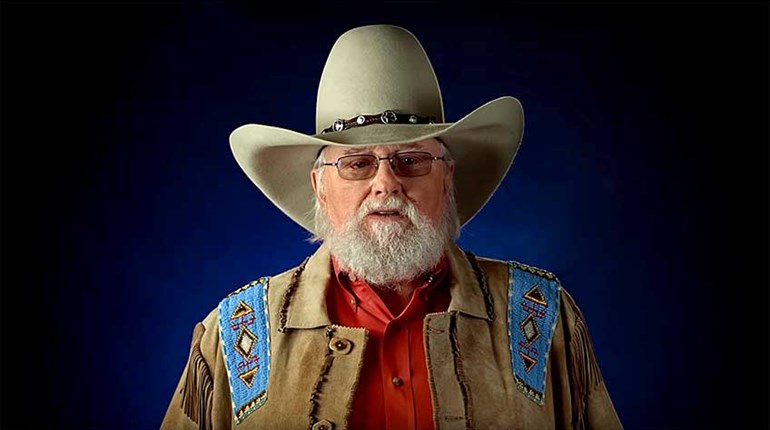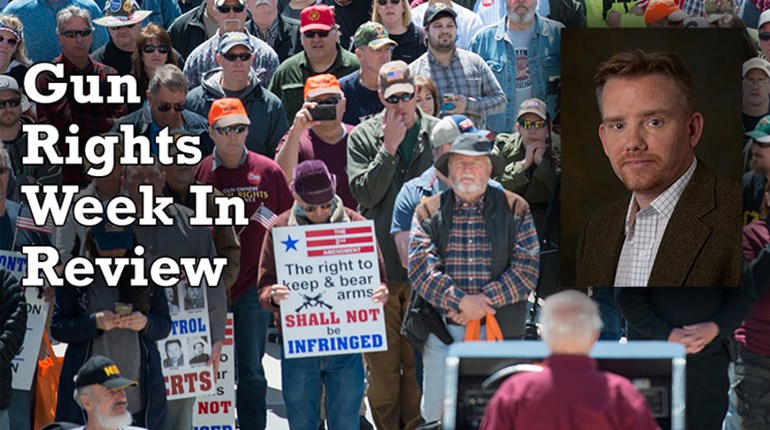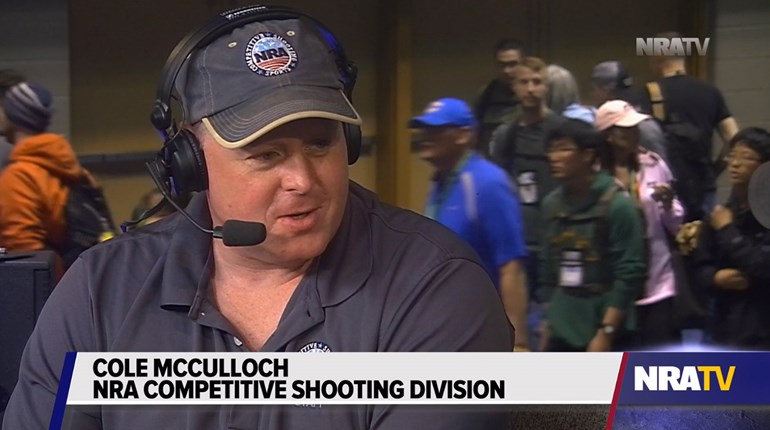
This feature appears in the March ‘17 issue of NRA America’s 1st Freedom, one of the official journals of the National Rifle Association.
For a guy who says his biggest regret is not passing more gun control laws, President Barack Obama sure did grant clemency to a lot of criminals who had violated federal gun laws already on the books. Over his last year in office, Obama commuted the sentences of hundreds of criminals, many of them in federal prison for breaking federal weapons laws. At the same time, Obama repeatedly said that the biggest regret of his presidency was his failure to pass more federal gun laws. Was he hoping that if Congress passed more gun control laws, he’d be able to pardon more people who had violated them? Do anti-gun advocates like Obama really believe that people should go to prison for transferring a firearm without a background check or for possessing an AR-15, but that drug traffickers who used a gun in the course of their criminal enterprise should receive a presidential get-out-of-jail-free card?
This is a perfect example of the schizophrenic attitude toward gun laws and law enforcement in the upper echelons of the Democratic Party’s leadership today. They proclaim that sweeping new gun laws are desperately needed at the federal level, while insisting that the criminal justice system is inherently biased against people of color. But if they truly believed their own rhetoric, why on earth would they want to put more laws on the books if such laws are going to be used against young black men in a biased way?
It’s almost like these anti-gun acolytes believe that violence can be stopped simply with the passage of gun control legislation. Enforcement has nothing to do with it, apparently. All that’s needed to “do something” is to just put the law on the books in the first place. Washington state’s “universal” background check law, for example, was supposedly a critical piece of legislation that would save countless lives. In nearly two years on the books, the state has used the law to charge only one person. Meanwhile, thousands of Washington residents are now breaking the law if they loan a firearm to a friend for deer season, or for plinking, or for self-defense. To the gun control crowd, this is victory. To the rest of us, it’s madness.
Maj Toure, artist, activist and founder of Black Guns Matter, says the men and women attending his events throughout the country are aware that the same politicians decrying the criminal justice system are also pushing more gun laws.
“The disconnect plays out with the people that come to our classes because they know the game certain politicians are playing, and they’re gravitating to the information on how to defend themselves intelligently and legally,” he explained. “They see the game whether the higher-ups know it or not, and they’re getting training and being put on the path by us, which is great. Politicians in these urban areas that are actually trying to solve this should sit with us so we can show them how to actually help the people.”
While gun control advocates proclaim, “We need more laws!”, gun owners are much more likely to say, “Enforce the laws on the books.” This means we make prosecuting those violent offenders in society our top priority in the criminal justice system. Don’t continually allow them to plea-bargain away their crimes. Don’t let them get away with a few months behind bars and time on probation for armed robberies or home invasions. Don’t pardon or commute their sentences while trying to make it harder for people to lawfully possess firearms. Focus on the individuals in society who are actually causing the problems, instead of treating the right to keep and bear arms as a criminal act.Anthony Guglielmi acknowledged that more than 90 percent of those shot in the city over the New Year’s weekend had criminal records, known ties to gangs, or were on the police department’s “strategic subjects list”...
Gun control activists seem to be bitterly clinging to their anti-gun ways, even when it’s clear that their gun-ban agenda is costing lives. In Baltimore, homicides topped 300 in 2016. That’s the second year in a row with more than 300 homicides, and it comes three years after then-Gov. Martin O’Malley signed the Firearm Safety Act into law. Chicago hit a grim milestone in 2016 with 762 reported homicides, a 57 percent increase from the prior year. In fact, 2016’s total was the highest Chicago had recorded in more than two decades. And the year ended as it began—violently, with five homicides and more than 30 people injured in shootings across the city. The gang violence that has scarred so many neighborhoods and taken far too many lives looks to continue unabated in 2017, thanks in part to the anti-gun policies and philosophies pushed by the Windy City’s elected officials—including Mayor Rahm Emanuel. As his city’s violence has spiraled out of control, Emanuel has cast blame on gun laws in other states and called for more federal gun control legislation. Like the rest of the anti-gun crowd, for Emanuel it’s always the next gun control law that’s going to make a difference.
Now and then, however, an official will let slip some inconvenient facts. According to the Chicago Tribune, for instance, police spokesman Anthony Guglielmi acknowledged that more than 90 percent of those shot in the city over the New Year’s weekend had criminal records, known ties to gangs, or were on the police department’s “strategic subjects list”—a list of about 1,500 individuals who’ve been deemed to be at high risk of being involved in violence, either as a perpetrator or a victim. In other words, these murders aren’t being committed by law-abiding gun owners.
So why do so many politicians in Chicago continue to act like it’s the legal gun owners who are to blame? More importantly, what can be done to turn the tide of violence in so many of Chicago’s communities?
It’s hard to know what really lurks in the hearts and minds of our elected officials, so maybe some Chicago politicians truly believe that they can ban their way to safety—to so tightly regulate gun ownership so much that it will be impossible for criminals to access a firearm. I suspect that some of the more cynical politicians know their anti-gun efforts won’t do much to reduce violent crime, but they don’t have any better ideas and they need to “do something.” There are better ways to “do something,” however, and they’re already being put into practice.
Toure took his teaching and activism to Chicago in the fall of 2016. Dozens of residents attended, learning about basic gun safety and Illinois’ gun laws. There were also pointed discussions on interrupting violence, conflict resolution and how to settle disagreements without resorting to pulling a gun. It is programs like Toure’s Black Guns Matter that will provide the foundation of something desperately needed in Chicago—a responsible gun culture.
John Cardillo, a former NYPD officer who now hosts a radio show from Florida, said when that culture of lawful gun ownership is missing, there is a tremendous cultural and societal impact.
“Guns aren’t part of the developmental culture,” Cardillo explained. “Kids don’t grow up going to the range or hunting. They’re inundated with left-leaning local news featuring left-leaning politicians who demonize guns as one of the world’s top ills. Gun equals bad. Gun owner equals bad guy. Banning guns equals good and safe.”
Toure agreed that the current hostility to legal gun ownership makes things worse in many cities.
“From what I see,” Toure said, “changing the mindset and culture of firearm ownership in these areas would dramatically deter crime and cut down on incarceration, which would all create more job and business opportunities. We’re talking firearm manufacturing, accessories, training facilities, ranges, etc. This has the potential to be great for tax revenue and employment if it’s taken from taboo to mainstream. In order to do that, you have to educate the people, and that’s what we are doing as our Phase 1 with Black Guns Matter.”
The city could do its part by removing ridiculous zoning restrictions that prohibit gun stores and ranges from operating inside city limits. JROTC air rifle programs, banned from Chicago public schools since 1999, could be allowed to return to teaching high-schoolers marksmanship and the discipline and responsibility that come with shooting. Imagine if young men in Chicago who were interested in guns had someone other than a gang member to mentor them. That sounds like some actual “gun sense,” doesn’t it?We shouldn’t accept the rising tide of violence in some large cities as the “new normal.” Nor should we resign ourselves to another round of rights-infringing gun laws in the name of “doing something.”
While cultural shifts like this would help, another important shift is also necessary—one that might even be more difficult to implement. The bonds of trust between law enforcement and the law-abiding people who live in high-crime communities in Chicago have been battered, and in some cases shattered, over the last few years. These two groups must work together if they’re going to be able to drive down the shootings, robberies and assaults that plague Chicago’s most violent neighborhoods.
The residents of these neighborhoods need to be able to trust that the police are looking out for them, that they can be trusted and that they are there to help. Police and prosecutors, in turn, rely on the community to provide eyewitness testimony, to help solve cases and take violent offenders off the streets, as well as to maintain a culture that doesn’t tolerate lawlessness. When these communities are at odds with each other, crimes don’t get solved (the clearance rate for Chicago homicides in 2016 was low—around 20 percent), which means criminals don’t get punished. Consequently, since they think they can get away with their criminal activity, they commit more crimes.
“Community cooperation as witnesses and sources of intelligence is absolutely imperative,” said Cardillo. “Without it, clearance rates are in the basement. Bad guys are, by and large, cowards who want easy prey. When they sense the tide in a community turning on them and toward cooperating with police, they tend to move on, or operate in the shadows.”
In other words, it’s a vicious cycle that can be interrupted if city officials and residents make improving these relationships a genuine priority. When these relationships improve, it makes it easier to engage in proactive policing—another key to driving down the crime rate.
We shouldn’t accept the rising tide of violence in some large cities as the “new normal.” Nor should we resign ourselves to another round of rights-infringing gun laws in the name of “doing something.” If leaders around the country want to get serious about fighting violent crime, then they need to crack down on the most violent offenders. These officials need to recognize that in cities across the country, guns are taboo objects coveted by criminals and those who want street cred, in part because of restrictions targeting legal gun owners put in place by these same officials. Instead of simply insisting, “Guns are bad, so don’t own one,” these cities need to start actively promoting a culture of law-abiding, legal and responsible gun ownership.
Residents of the hardest-hit communities and the law enforcement officers sworn to serve and protect them need to find common ground in dealing with those gangbangers transforming peaceful neighborhoods into war zones. It won’t be easy, but unlike another proposed law aimed at legal gun owners, it will make a difference.
Cam Edwards is the host of “Cam & Co.,” which airs live 2-5 p.m. EST on NRATV and midnight EST on SiriusXM Patriot 125. He lives with his family on a small farm near Farmville, Va. Follow him on Twitter and Instagram @camedwards.


































